Three different strategies generally prevail when looking at international businesses’ use of Facebook Brand Pages:
- “Single language” global page: Most international organisations are managing a single global Facebook page. In other words, fans are seeing the exact same content in the same language regardless of geographic location.
- Separate country brand pages: Localised versions for the different countries the global organisation is targeting, e.g. a page for Germany, another one for the UK and so forth.
- Global/Local approach within same page: Finally, some global brands have centralised all Facebook activity under one global page and provide a blend of global and local content by using the geo-targeting feature currently available to Facebook page owners.
Current geo-targeting setting on Facebook
Pros and cons of each approach
Like with most things here in life, there is no one-size-fits-all solution, as the appropriate strategy will largely depend on the size of your organisation and the role that Facebook plays within your vertical.
But while there are obvious advantages of sticking with a “single language” global page, such as consistent tone of voice, higher degree of control and lower maintenance costs, independent research shows time and time again that local Facebook pages yield far better results.
In fact, analytics from Socialbakers show that local pages can be up to 10 times as engaging as global brand pages.
This is further supported by Mainstay Salire, whose data suggests that “the typical Facebook post from a local page reaches five times the percentage of fans as a corporate post, and eight times as many of the fans reached will engage with that post. Combining those two factors—five times reach and eight times engagement—Mainstay concludes that a local fan is 40 times more valuable than a corporate fan on Facebook.”
Whether or not the total value can be accurately compared through such a calculation is questionable, but the figures above certainly suggest that the pros of localising social media profiles outweigh the cons.
Large brands like Coca-Cola and Carlsberg are trying to combine the best of both options by gathering all their country brand pages under one official corporate page through the use of the current geo-targeting setting. This means that I, when accessing these pages from a Spanish IP address, automatically see a mixture of content targeted specifically at Spanish speakers, as well as broader appealing English content distributed across all countries and languages. You might not end up with as local a version as when having separate brand pages, however this feature allows you to maintain a higher degree of control and keep costs at a reasonable level.
Neat feature from Facebook to launch soon: “Switch region”
This might be old news to some, but an iteration of Facebook’s existing geo-targeting feature is currently under way. It is dubbed “Switch Region” and is expected to launch soon (you can check it out on Facebook’s Marketing Page where the feature has been live for some time now – click the cog icon in the upper-right corner and it will appear in the drop-down menu).
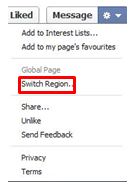
So, what is changing?
- Organisations that have multiple country brand pages will be able to easily gather all of its different pages under one. In its current version, like the one employed by Coca-Cola and Carlsberg, the level of localisation is limited. For example, the tabs and the “About” section of Coca-Cola’s page remain in English although accessing the page from a non-English speaking country. Switch Region will provide a higher degree of localisation, as templates can differ from one page to the other.
- Long before this feature was in the makings, Starbucks acknowledged the benefits of employing a centralised, yet highly localised approach. The coffee giant’s customised “International” app can best be described as a geo-selector for Facebook and basically serves the same purpose as is intended with Switch Region, which is to make it easy for the visitor to select his/her preferred version on one hand, while allowing international corporations to gather their entire following in one place on the other.
- In relation, as a Danish native living in Spain, I will be able to choose the Danish version (if available), whereas now I am restricted to viewing a mixture of English and Spanish content. Offering choice is always desirable from a usability perspective.
All in all, this is a neat iteration which will come in handy for many international organisations. It does not, however, magically create localised pages for you. So, if you are operating on a global scale and seeing a notable revenue contribution from foreign markets but have yet to glocalise your Facebook business presence, the upcoming launch of Switch Region should further incentivise that move, I would say.

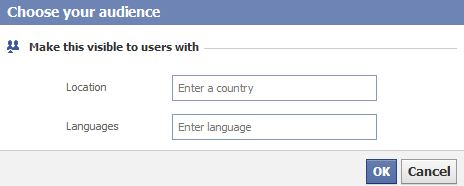
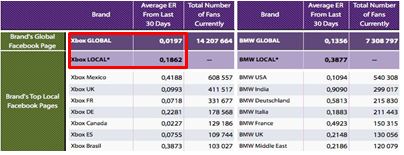

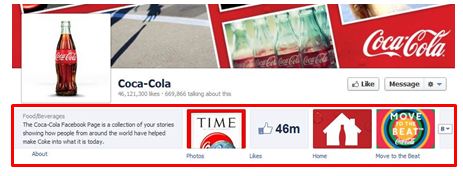
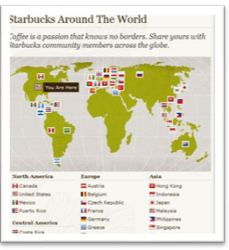
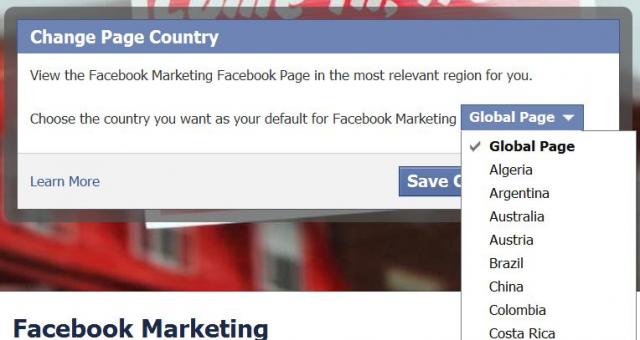







2 responses
Hi there
Thanks for this info. Does this mean that the current geo-targeting feature will be removed completely? I wanted to geo-target a post today and the option has suddenly disappeared! Not sure if this is a glitch, or if the feature has already been removed because the new Switch Region feature is coming soon.
Do you know where else I can get info about this?
Thanks!
Hi Kiara,
Thanks for your comment. The old geo-targeting options will still be available. The reason to why the option seems to have disappeared is very likely correlated with the occurrence of Facebook slowly rolling out more targeting capabilities, such as gender, age, relationship status etc. in addition to the current language and geographic settings. TechCrunch wrote an article about this here: http://techcrunch.com/2012/07/31/page-post-targeting-enhanced/
Language and geographic will still be available to page owners once launching Switch Region, it seems – which indeed makes sense as it’s still a useful feature for those who don’t see the benefit of switch region, but still find value in the current targeting setting.